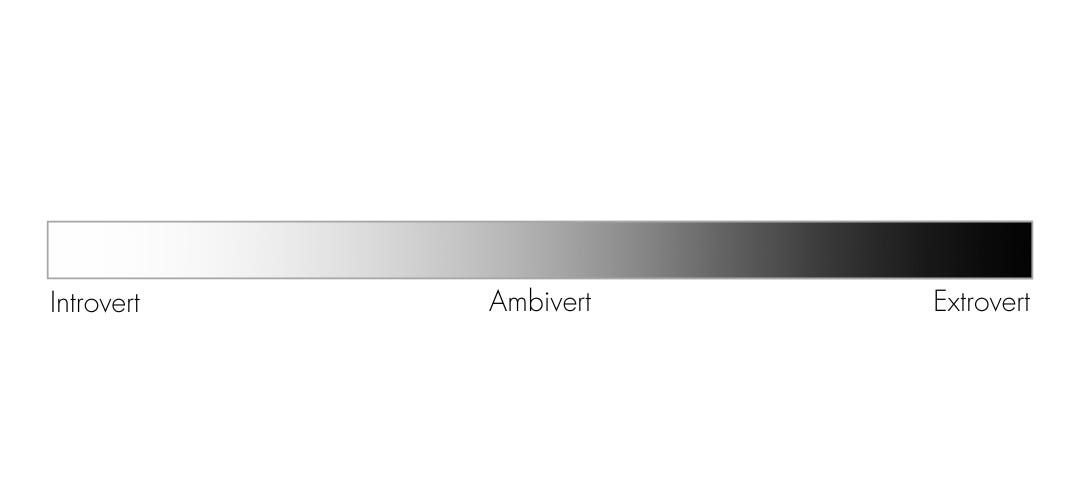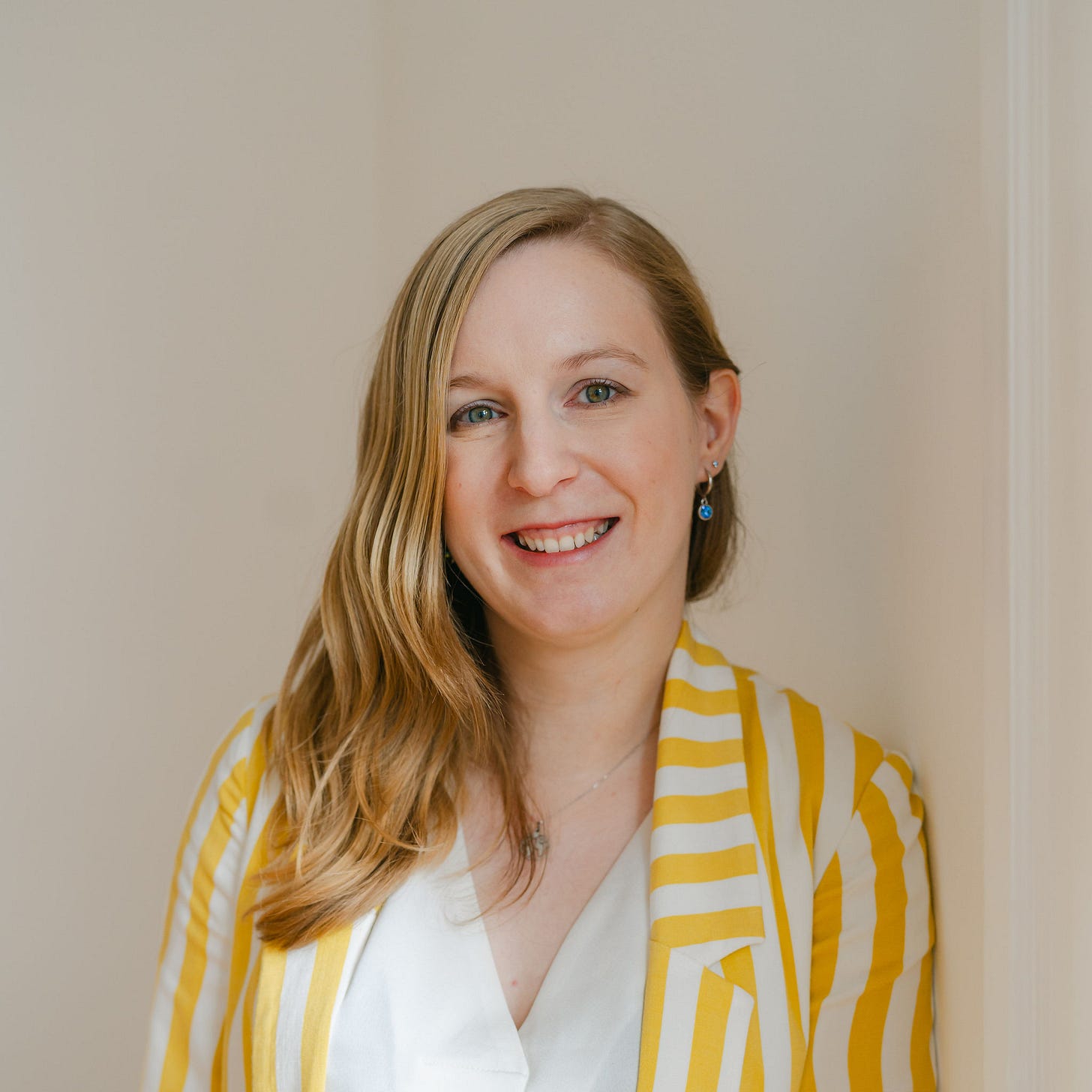What Does Being an Introvert Actually Mean?
including a quiz to figure out if you are one

7-min read (+5-10 minutes for the quiz)
When I tell people I’m writing about introversion, they always say, “I’m an introvert too, but I have extroverted tendencies, and people don’t believe I’m an introvert.”
The terms introversion and extroversion are used to describe behaviors that are typical for them, but that’s not the definition.
going to networking events, talking with a lot of people: extrovert
being quiet: introvert
charismatically presenting: extrovert
working alone and avoiding meetings: introvert
seeking adventure and excitement: extrovert
not partying: introvert
My mission is to bust the limiting mindset about introversion and tell everyone what it really means to be an introvert based on studies.
The points above are behaviors everyone can do, excel at and have nothing to do with introversion vs extroversion. We misuse the words to put people in drawers.
Introverts’ and extroverts’ brains are built differently, and you can’t change that.
I’ll tell you:
what it actually means to be an introvert
what ambiversion is
what type of person you are (a small quiz included)
Most of the things I’m gonna talk about are from the books “Quiet” by Susan Cain and “The Introvert Advantage” by Marti Olsen Laney Psy.D.
What does being an introvert mean?
The brain works differently. Introverts and extroverts are wired differently. There are 3 main differences:
how they refuel
how they respond to stimulation
how they approach knowledge and experiences
Introverts are stimulated faster and more easily because they process the world more intensely. We are more observant, and all of that needs to be processed.
Were you ever in a group of people trying to talk and socialize, but your brain was just empty? That’s stimulation overload.
The environment or the people might be too loud, they are changing the topics fast, or you don’t have anything in common with them.
I’ve been in those situations, and it’s not a great feeling not knowing what to talk about. It’s one of the reasons why I:
made a course about networking,
avoid some networking events where the acoustics were bad,
and I prepare myself by googling the venue and thinking of topic points
We need more time to think and process the environment, the new people, the topics, and what answers might work.
And because of the stimulation overload from the outside world, our energy drains faster. We need time alone to recharge again. Less stimulating and time to process (and overthink everything).
And the third difference is about breadth and depth. Extroverts want to be everywhere and talk to everyone. They are generalists. They know many people and say they’re all friends, even though they don’t know much about them.
Introverts, however, prefer depth. They love having deep talks with friends. They love focusing on one problem and fixing it.
How do you think scientists like Albert Einstein invented so many amazing things? They were deeply focused on finding a solution and didn’t stop until they found it. (And back then, there weren’t as many distractions.)
Introverts and extroverts need different work environments to thrive.
Introverts: quietness to focus and get it done
Extroverts: buzzing open-plan office or coffee shop, or brainstorming
It’s about different responses to stimulation, and that affects their energy levels.
I work in an open-plan office, and I always need to be aware of what’s going on around me because my boss could call me anytime. On one ear, I have some podcast or music to block out some noise so I can focus, but I’m not 100% productive in this environment.
For extroverts, being at home alone to work is not stimulating enough to be productive. They need someone or noise.
What does this mean for the points I made at the beginning of the newsletter?
Introversion IS NOT about behavior but how the brain works.
Introverts can learn:
to talk with people confidently (with people we trust, we behave “like extroverts”)
to present charismatically and confidently
to lead a big team of employees and talk in meetings with impact
to love adventures and excitement
But it always comes back to finding the balance and recharging our energies.
And just like that, extroverts can also learn:
to listen
to observe
to focus and work alone on a project
to be independent
to enjoy quietness
But they need people and noise to keep their energy high.
Some might say now, “I’m an introvert, but in some contexts I can confidently talk a lot and feel like an extrovert.” Everyone has those contextual personality shifts, but introversion always comes back to how you gain your energy and not about how you behave.
What is ambiversion?
Nobody is 100% introverted or extroverted. Everyone is somewhere on the spectrum in between, just like the Gaussian distribution.
As we age, everyone becomes more ambivert because we find the balance of quietness and comfort to talk more. And I agree. We grow, and we expand our comfort zones, and that includes becoming more ambivert.
Aging also includes gaining wisdom and confidence and letting go of people-pleasing. It makes one person more comfortable being themselves and speaking their mind. Less overthinking, which is what introverts tend to do a lot.
I’m 30 now, and I can already feel the pull towards ambiversion as I’m growing, working on my business, and caring less about what other people think.
The last point limited my actions and words a lot. At first, I let go of my shyness through years of talking with strangers and being the leader of a student organization. And now I care less about what other people think with every year I’m getting older (and every post I’m publishing on IG).
To conclude this long explanation of introversion, extroversion, and ambiversion, I want you to self-assess to know where you are on the spectrum.
The Quiz
Let’s figure out where you are on a spectrum of introversion to extroversion.
Be honest with yourself and answer as who you are (not who you wish you were or others expect you to be).
(Don’t mind the mistakes and short options; it didn’t let me put in more characters. 🙁)
The result
More than 7 of option 1: You’re an extrovert. You need the people and activities to keep up the high energy you have. You thrive in social gatherings and networking. With age, you might want to slow down a bit because quiet time could be good for your body and mind too.
Around 5 of each option 1 and option 2 (or torn between the options): You’re an ambivert. You may feel torn between the two options I gave you, and depending on the environment, you may feel comfortable talking or not. You may feel confused sometimes about what your body needs, and it’s important to listen to find your balance.
More than 7 of option 2: You’re an introvert. And you can feel some high sensitivity too. You need to take care of your energy levels to be able to focus and work on your dreams. With age, you’ll gain more confidence, and I’ll help you let go of limiting beliefs to find a good balance of friends, family, success, happiness, and work.
This newsletter is called “Quietly Thriving” and I’ll speak more about topics for introverts, but everyone is welcome to gain new insights from my writing. It’s always good to know about introversion as an extrovert too, because you’ll understand your quiet friends, colleagues, and employees better.
Ready to Stop Dreading Networking?
Let’s be real: knowing the right people does open doors. I resisted that truth for years until I learned how to connect on my own terms, as an introvert.
You don’t need to “fake it” or become an extrovert to network confidently.
You just need a better system one built for how you naturally communicate.
In my guide, “Network Confidently as an Introvert,” you’ll learn:
What to say (and how to say it without overthinking)
Easy conversation openers + cheat sheets for small talk
How to follow up without feeling pushy or awkward
No more blank-mind panic. No more avoiding events or opportunities.
Just a simple approach to networking that feels natural and actually works.
For the Quietly Curious
I started watching the Kardashians for the first time, and I’m obsessed. They are hugely successful and have a strong family bond. I love that! I asked ChatGPT how to become as successful as Khloe Kardashian
I’m currently working on my money mindset, and my mind is in the messy middle of removing the old and adding the new (and my success isn’t there yet). It’s not easy to change and grow.
I’m obsessed with my hanging chair on the balcony at the moment, enjoying the warmth of spring.
ℹ️ I send this email weekly. If you would also like to receive it, join the 160+ other smart people who loved it today.
👉 If you enjoyed reading this post, feel free to share it with friends or click the ❤️ button on this post to change the perception of introversion.
Wish you all the best,
Karina



